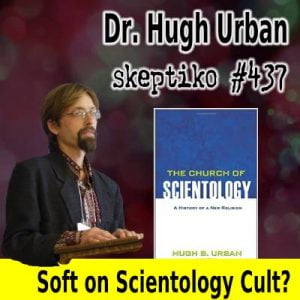Understanding the Fine Line Between Cults and Religions
 In a thought-provoking conversation on the Skeptiko podcast hosted by Alex Tsakiris, Dr. Hugh Urban, a professor of comparative religions at Ohio State University, delves into the intricate world of religious studies. This blog post expands upon seven key points from the first 30 minutes of their dialogue, providing a deeper understanding of the complexities surrounding cults and religions.
In a thought-provoking conversation on the Skeptiko podcast hosted by Alex Tsakiris, Dr. Hugh Urban, a professor of comparative religions at Ohio State University, delves into the intricate world of religious studies. This blog post expands upon seven key points from the first 30 minutes of their dialogue, providing a deeper understanding of the complexities surrounding cults and religions.
1. Cults vs. Religions: The Scientology Debate
The discussion with Dr. Urban opens up with a crucial debate: What differentiates a cult from a religion? Using Scientology as a primary example, Dr. Urban illustrates the fluidity and contentious nature of such classifications. This segment of the conversation sheds light on how societal perceptions and legal recognitions can vary significantly, influencing the definition and acceptance of religious movements.
2. Scientology’s Evolutionary Journey
A focal point of the conversation is the transformation of Scientology from a marginalized group to a religion recognized in certain countries, while still viewed as a cult in others. This metamorphosis prompts important questions about the factors that contribute to the mainstream acceptance of such organizations and the role of societal norms in shaping these perceptions.
3. Controversy and Practices in New Religious Movements
The talk then navigates through the controversial figures like L. Ron Hubbard and practices such as sex magic, associated with Aleister Crowley and Jack Parsons. This leads to debates about the authenticity and intentions behind their beliefs and rituals, and how these elements are perceived in both academic and public spheres.
4. Academic Approach to Religious Studies
Dr. Urban emphasizes the significance of maintaining a balanced approach in religious studies, intertwining respect for diverse beliefs with a critical examination of their practices. This approach highlights the complexities faced by scholars in objectively studying and presenting religious and spiritual phenomena.
5. Studying Extended Consciousness and Psychic Research
The dialogue explores the academic legitimacy of studying extended consciousness and psychic research. It debates the boundaries of empirical research in academia and the potential of these fields to expand our understanding of human consciousness and spirituality.
6. Personal Beliefs in Academic Research
A key discussion point revolves around the influence of personal beliefs on academic research. The conversation critically examines the necessity for scholars to maintain objectivity, while also acknowledging how personal experiences and beliefs can shape their academic pursuits.
7. Legal and Social Challenges Faced by New Movements
The conversation also touches upon the legal struggles of organizations like Scientology, particularly its longstanding battle with the IRS. These challenges raise important questions about how legal systems interact with new religious movements and the societal implications of these interactions.
To gain a more comprehensive understanding of these intricate topics, listen to the full conversation on the Dr. Hugh Urban, Scholarly Look At What Many Call Cults |437| episode of the Skeptiko podcast hosted by Alex Tsakiris.
Also read: Dr. Hugh Urban Biography
Watch the Related Discussion on YouTube
For additional insights into the world of cults, religions, and spiritual practices, watch this related YouTube video:





